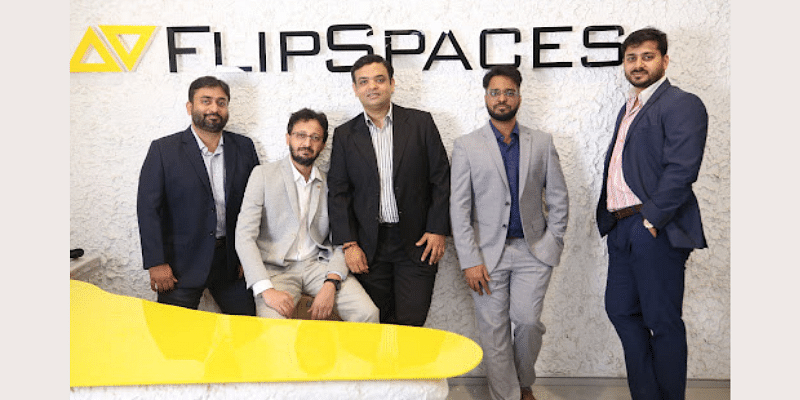In a world raring to be different, it is the vision that makes individuals stand apart. Having dabbled into entrepreneurial stints earlier and with a successful build-scale exit in ed-tech behind him, Kunal Sharma had his eureka moment while checking out a multiplayer game at home. Almost serendipitously, he met Ritesh, who was the tech-head of a boutique gaming startup then, at a jam session given their common interest in music.
“What started off as a musical confluence in the evening turned into a full-blown business idea by night,” Ritesh, now the Chief Product Officer at Flipspaces, smiles as he recounts.
Rewinding a bit, the founders at Flipspaces have been friends from their IIT Bombay days. “We started as a product supply and distribution brand in furniture and furnishing. While the business was doing well, there was something amiss – the big idea! That was the time when the whole interior design industry was unconsolidated with no novelty in customer experience. There was no synergy between space design, product supply and project execution in the interior design space. It was a fragmented value chain with different companies offering piece-meal services. What was lacking was a seamless customer experience which could be delivered at a level of scale.” says Ankur Muchhal, the co-founder and Head of International Business.
Cut to 2015, when the team started working on the ‘big idea’ around technology, they believed they had cracked the code to take the consumer experience in interior design to the next level backed by a vision of a multi-module technology product. Merging forces with a tech team through acqui-hire, and with Ritesh coming in as the Chief Product Officer, Flipspaces was born as a first-of-its-kind, interior-design-tech brand.
“Until now, we have been fairly averse to media glare. We believe our work should be the mouthpiece for the brand,” Kunal reflects.
On the back of their tech-driven vision, Flipspaces tech-platform has now catered to over 5+ million sqft of commercial spaces globally for renowned companies across corporates, start-ups, MNCs, retail brands and SMEs such as BSH, NoBroker, Open Financial, Times Group, Aditya Birla, InstaOffice, BharatPe, Nivea, Oppo, P&G, Reebok, Royal Enfield, Razorpay, Bounce and PlaySimpleGames in India and the US. The venture targets categories across commercial-like offices, retail, hospitality, education and health care institutions among others and provides a one-stop, tech-enabled solution to its clients for design and build.
Why the Commercial Focus thus far?
Kunal explains, “What is unique to our business is the size of mandates we execute and the gross margins we command. Fundamentally robust unit economics has allowed us to scale the business while remaining profitable even at the EBITDA level. As a tech-led commercial design and build leader, we have a ticket size that is 10X of other Interior Design startups like Livspace and Homelane, a market size 8X of these players, with India and US combined, and a more templatised product and delivery ecosystem. In an otherwise execution heavy business, which is the typical perception of the interior design industry, we are able to scale without compromising on time or quality because of the category we operate in and the supply chain and delivery mechanism we have developed to seamlessly operate at scale. Our unit economics are much stronger than most or all the funded players and thus results in far better Return on Capital Invested. Additionally, with footprint expansion in the US and setting up a business unit in GCC, Flipspaces is living its vision of becoming a global design tech brand.”
Addressing the shift from commercial spaces being ‘place of work’ to being ‘second homes’
An industrial economy is almost always synonymous with rigid social hierarchies, mechanical tasks and regulated office norms such as fixed 9 to 5 working hours or a traditional office set-up. On the contrary, the knowledge economy has given rise to blurred lines of command, a collaborative style of management and a culture built on trust. This shift changed the very essence of what a workplace signifies in our lives. “With the maximum of one’s waking hours being spent in workspaces; offices, retail outlets, health and educational institutions etc, it has rightfully become our second home. Needless to say, today’s offices are no longer a set of cabins and cubicles with piles of paper files adorning every corner; instead, they are meant to be spaces that exude culture, comfort and a sense of belonging,” says Vikash Anand, Co-Founder and CSO.
Unlocking opportunities induced by the growing entrepreneurs and SME community
Micro, Small and Medium Enterprises (MSME) has become the sunrise sector for the Indian economy accounting for 37% of the national GDP and 40% of India’s workforce. An equally compelling fact is that within this MSME ambit, lies the 60,000+ startups which make India the third largest startup ecosystem in the world. The Indian start-up ecosystem is nothing less than a revolution with $106-billion worth of value-creation by 44 unicorns, in turn creating 1.4 million direct and indirect jobs and growing at an impressive rate of 15% year on year.
“A startup or SME or any business for that matter has to solve for the challenge of creating a differentiated identity for two key stakeholders – the clients it hopes to attract and the talent pool it looks to hire. Having a differentiated space which is in sync with a brand’s ethos and vision is a key factor in breaking through the clutter in both these highly competitive functions. That is the challenge Flipspaces looks to solve for business owners as a single point of contact using technology and process as a significant moat,” says Kunal.
Since a majority of the mandates come from the startup and SME segment, Flipspaces believes they have perfected their game when it comes to bringing in new age ideas and designs to life while having the necessary supply chain templates to create client delight at a level of scale. “End of the day, interior design is a permutational supply chain problem. If you can simplify complex-looking designs to smaller granular elements and build a supply chain around it, you have cracked a large part of the problem. What looks like a bespoke solution to a client is in fact a template within the Flipspaces ecosystem. That is the reason we have been able to scale.” says Mrinal Sharma, Co-Founder and COO.
Disrupting through technology as the differentiator
“At Flipspaces, Technology is the way of life. We firmly believe in the power of technology to create process efficiency thus creating control over the bottom line. Additionally, tech also creates a differentiated client experience thus helping increase topline. The industry size is a massive 1 Trillion $ plus, and we are hungry. Technology is a critical tool to satiate that hunger,” Vikash adds with visible enthusiasm.
With VIZWORLD, the proprietary tech-suite within Flipspaces, we are looking to create one integrated product which creates efficiency and customer delight in each step of this process. Interior design and build is fairly complex and requires deep domain expertise which can consequently create the ability to develop SAAS products for respective verticals. This is where the design and build pedigree creates substantial leverage for Flipspaces.
Delighting the value-conscious customers
It is rightly said that no business can survive until you have customers who can back your work. The success mantra for Flipspaces lies in the immense customer love it gets which is reflective in their growing repeat and referral business accounting for over 60% of their revenues. They understand their customers well and what they want as they grow.
“The expectation of an SME client is very different from that of a large corporate mandate. An SME client is more value-based rather than cost-driven. Another key difference is they do not have fixed teams to execute their expansion plans thus need a one-stop solution. We recognise this behavioural difference which is identical to the B2C market. At the same time, being commercially focussed allows for much better ticket size and significantly better Return on Effort Invested,” says Vikash.
Unfolding the future vision of becoming a house of SAAS products
The future of interior design is to make the customer journey engaging and inclusive. With the help of its integrated technology stack, Flipspaces has the sole vision of becoming the biggest global design-tech brand by bringing the three disjointed aspects of design, product and delivery experience under one roof for its customers. The company claims to be following the Amazon model in that journey.
“With increased impetus on technology, we are getting closer to the vision of becoming a house of SAAS products. Each of these products with the Vizworld technology suite are first created and tested in-house, in order to drive organisational efficiency in our own design and build verticals. Subsequently, the vision is to roll them out as SAAS offerings for third party stakeholders. In the same light, our first such SAAS offering, Vizstore, is seeing a phenomenal response in the furniture and furnishing retail market,” says Kunal with visible excitement about what the future holds.




![Read more about the article [Investor Summit 2021] Capture value before thinking about an exit, says Pankaj Makkar, MD, BII](https://blog.digitalsevaa.com/wp-content/uploads/2021/04/pankaj-investor-summit-1617239632401-300x150.png)

![Read more about the article [Funding alert] Apna.co raises $12.5M in funding round led by Sequoia India and Greenoaks](https://blog.digitalsevaa.com/wp-content/uploads/2021/02/165-VC-funding1552277843560-300x150.jpg)



